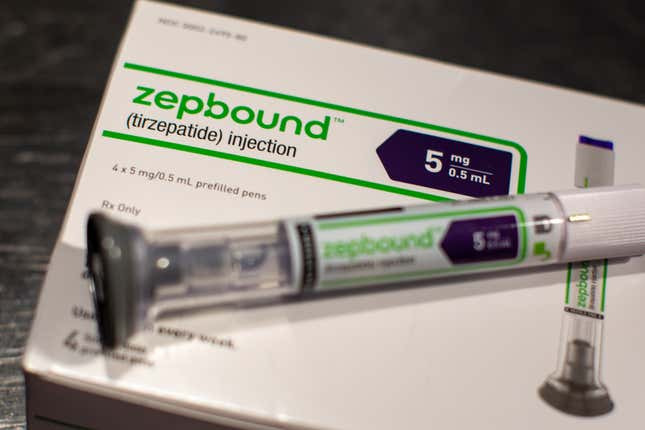
In This Story
Eli Lilly (LLY+0.74%) is making more doses of its blockbuster weight-loss drug Zepbound available in vials and at lower prices.
The pharma giant announced on Tuesday that it is now expanding its single-dose vial offerings of Zepbound to include higher doses.
Last August, Eli Lilly began selling the lowest doses of Zepbound — 2.5 mg and 5 mg — in vials rather than the standard auto-injector pen, cutting the price by about half. Now, it’s adding two higher doses to the mix and further reducing the price of the lower ones.
As of today, patients can purchase a month’s supply of Zepbound in vials at the following prices:
- 2.5 mg: $349 (down from $399)
- 5 mg: $499 (down from $549)
- 7.5 mg: $599
- 10 mg: $699
For comparison, the list price of Zepbound in auto-injector form is $1,086.37 per month.
Eli Lilly is also launching the Zepbound Self Pay Journey Program, which lowers the price of a patient’s first prescription of the 7.5 mg or 10 mg vials to $499, along with any refills made within 45 days of the previous prescription cycle.
The new vial options are available exclusively through LillyDirect, the company’s direct-to-consumer platform. The lower doses, however, are also accessible through Ro, a digital healthcare provider.
While Zepbound patients start with a 2.5 mg dose and gradually increase their dosage, Eli Lilly’s two highest doses remain available only in auto-injector pens.
The company said the expansion aims to improve access to the drug, which many health insurance plans still don’t cover.
“Every major medical organization recognizes obesity as a chronic disease, yet insurance and federal programs do not systematically cover people living with obesity for medical care—this needs to change,” said Patrik Jonsson, president of Lilly Cardiometabolic Health and Lilly USA, in a statement.
Until then, Jonsson added, the company will continue to introduce new options to improve the “affordability and availability” of its medications.
The move also comes as cheaper, off-brand versions of the medication are expected to leave the market soon.
The U.S. Food and Drug Administration recently removed Zepbound, along with Novo Nordisk’s rival drug Wegovy, from its drug shortage list.
Typically, the Food, Drug, and Cosmetic Act prohibits compounding drugs that are copies of commercially available medications. However, when a drug is on the FDA’s shortage list, it is not considered “commercially available,” allowing compounding pharmacies to produce alternatives.
During recent shortages, several digital healthcare companies capitalized on the loophole, selling compounded versions of Zepbound and other weight-loss drugs at a fraction of the cost of the brand-name medications.
Compounding refers to the customization of an approved drug by a pharmacy or physician to meet the specific needs of an individual patient — but with Zepbound no longer classified as “in shortage,” companies selling compounded versions of the drug must stop by March 19.